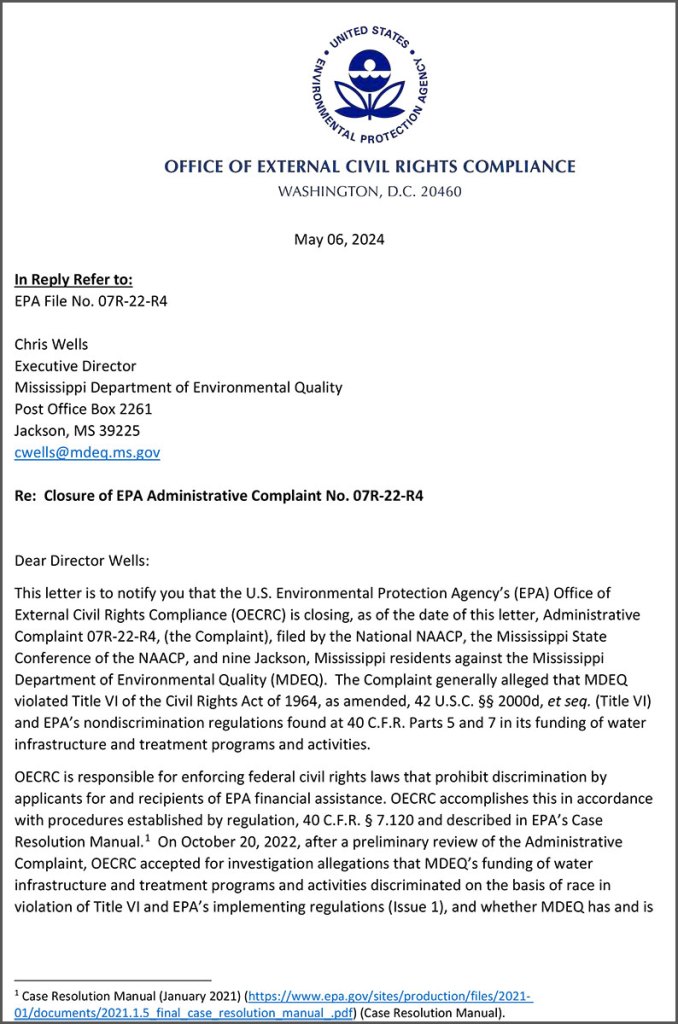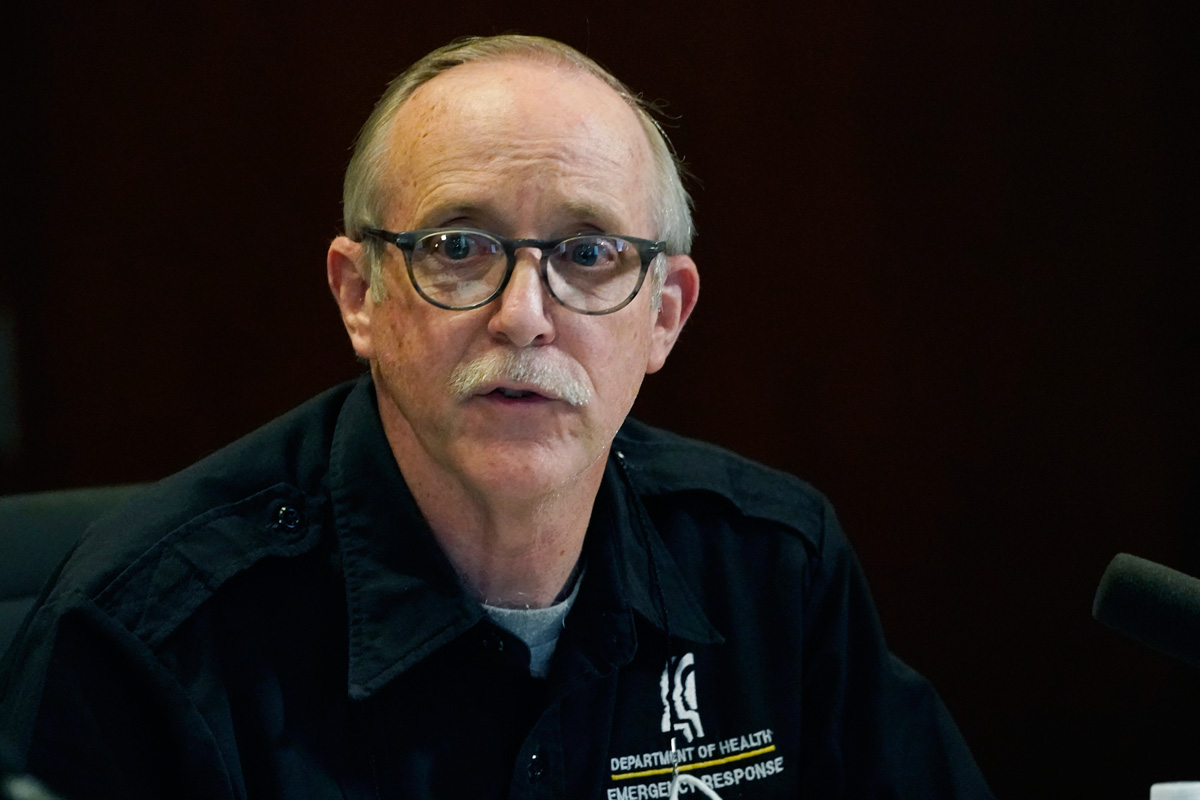Two Mississippi state agencies did not racially discriminate against the City of Jackson in how they spent money for water infrastructure projects, a U.S. Environmental Protection Agency investigation found. The investigation began after civil rights groups filed complaints. The EPA’s report on Monday specifically said that neither the Mississippi Department of Environmental Quality nor the Mississippi Department of Health violated the Civil Rights Act of 1964 in their allocation of federal funds for the capital city’s water infrastructure.
“OECRC found insufficient evidence of a relationship between the amount of funding disbursed by MSDH to Jackson and the racial composition of the community over time, and insufficient evidence of a relationship between the racial composition of communities receiving funds versus those not receiving funds,” the EPA told MSDH in a summary of it findings.
Both agencies acknowledged the determination in statements to the Mississippi Free Press. NAACP Environmental and Climate Justice Director Abre’ Conner told the Mississippi Free Press in a May 9 interview that the conclusions were disappointing, but that the recommendations validated part of the NAACP’s complaint.
“It’s unfortunate that the EPA decided not to trust the voices of the residents,” Conner said. “But the EPA issuing these recommendations to the state is a huge deal. They mention that the way the (funds) are handed out is a problem. We’re curious to see if the governor and the agencies are going to consider changing it.”
‘We Thought the Legislature Would Be Inclined to Help’
The NAACP and others filed the racial discrimination complaint against the public health agencies on Sept. 27, 2022, asking the EPA to investigate their allocation of federal funds meant for the water infrastructure fixes in majority-Black Jackson. The complaint followed the height of the Jackson water crisis when residents went weeks without access to safe running water.
“For years, the State of Mississippi, its agencies, instrumentalities, and officials (collectively “the State”) have discriminated on the basis of race against the City of Jackson, Mississippi (“Jackson”) and its majority-Black population by diverting federal funds awarded to ensure safe drinking water and unpolluted surface waters and groundwater,” the NAACP complaint alleged.
The complaint also accused the office of the State, including the Office of the Governor and the Legislature, of historically being “engaged in a long-standing pattern and practice of systematically depriving Jackson the funds that it needs to operate and maintain its water facilities in a safe and reliable manner.”

The EPA officially opened its investigation on Oct. 20, 2022, looking into MDEQ and MSDH for potential violations of two guidelines: Title VI of the Civil Rights Act of 1964 and the EPA’s non-discrimination regulatory requirements and procedural safeguards.
MDEQ is primarily responsible for oversight of Mississippi’s wastewater systems. MSDH oversees its drinking water systems. In the case of Jackson, both the city’s water and wastewater systems have been the target of federal intervention in recent years.
The funding mechanisms referenced in the NAACP complaint are the Drinking Water State Revolving Loan Fund and the Clean Water State Revolving Loan Fund. These mechanisms dole out federal funds to municipalities that apply at low interest rates, and for some communities, offer principal forgiveness that pays for some of the cost.
Prior to the federal takeover of Jackson’s water system, the city received revolving loan funds on four separate occasions: $10.8 million in 2016, $12.9 million in 2019, and just under $28 million in 2021, with a smaller $466,000 emergency loan in 2016 as well.
Jackson began the application process for a loan as far back as 2010, but the City’s application included two projects: a beautification project that was ineligible for revolving loan funds and a pipe main replacement that would have been an appropriate use of federal funds.
But Jackson never completed the loan application process. Former Mayor Harvey Johnson, Jr. told the Mississippi Free Press in a March 2023 interview that he had elected to pursue a grant for the project, rather than a loan, through the Mississippi Legislature for the repairs. Ultimately, the Legislature provided a loan anyway.
“The Legislature was affected by the piping problems that year,” Johnson said on May 9, 2024. “We thought the legislature would be inclined to help the City with the pipes.”
An EPA analysis of MDEQ’s oversight of the Clean Water State Revolving Fund found 13 separate loans to Jackson since 1990 and came to the same conclusion: that racial bias had not played a role in the disbursement of funds.
While the EPA announced both investigations are closed, a note in the May 6, 2024, report to MDEQ shows that the federal agency identified “a number of deficiencies regarding MDEQ’s implementation of procedural safeguards.”
But the agency “met with MDEQ to attempt to resolve these issues informally”, pursuant to EPA regulations, the report states.
Recommendations ‘A Huge Deal’
Although the EPA cleared both agencies of civil rights violations, the EPA did highlight issues with the revolving loan fund program as it currently exists in Mississippi.
Loans to low-income communities like Jackson are subject to partial loan forgiveness, depending on the relative degree of income disparity in the community. Technically, communities that fall below less than 70% of the state’s median household income are eligible for 45% principal forgiveness, meaning that they would only have to pay back a little over half of the loan—a potent vehicle for delivering what are essentially grant funds to needy communities.
But MSDH sets a cap on principal forgiveness due to the limited amount of funds available. The maximum is $500,000 per project. For a small community seeking a $1 million loan, nearly half could be forgiven. But Jackson’s water needs are measured in the hundreds of millions: accordingly, all of Jackson’s loans have been in the tens of millions. Even at the maximum possible forgiveness, only a small percentage of the principal was ever eligible for forgiveness.

MDEQ’s cap is in some critical ways even more restrictive; while the amount of principal forgiveness available is even higher, Jackson is categorically disfavored from accessing the subsidized funds. MDEQ places all cities with less than 4,000 residents and median household income below $40,000 at the top of the priority list for subsidized funding. But EPA pointed out that such criteria favor small majority-white cities and small majority-Black cities—finding no evidence that such a cap is racially disproportionate.
The EPA acknowledged these limitations. “The forgiveness cap may be preventing Mississippi from supporting low-income communities with larger scale projects that are deterred by the large loan award needed and relatively small loan forgiveness available,” the agency wrote in its letter to MSDH.
EPA recommended the state “conduct a detailed needs assessment statewide on a recurring and regular basis to ensure that funding mechanisms are available to address water infrastructure needs in small and medium-sized systems as well as Jackson,” among other suggestions.
“That the EPA issued these recommendations to the state is a huge deal,” the NAACP’s Abre’ Conner said. “They mention the way the loans are handed out as a problem. We’re curious to see if the governor and the agencies are going to consider it.
Importantly, however, these recommendations are just that—recommendations. They carry no legal weight and are up to MSDH and MDEQ to voluntarily consider.
Previously, MSDH Senior Deputy Jim Craig explained to the Mississippi Free Press that MSDH was doing what it could with highly limited funds.
“The amount of principal forgiveness available within a given year is a function of the size of the program’s annual allotment of funds from the EPA for a given federal fiscal year,” Craig said in 2023. “The State of Mississippi is constitutionally unable to forgive debt. As there are approximately 1,100 eligible public water supplies in Mississippi, the programmatic strategy has been to apply available principal forgiveness to help as many systems as possible.”
While Craig agreed that the revolving loan fund was the primary engine of federal water systems funding in the modern era, he acknowledged that it was simply insufficient to address the country’s massive and growing water needs.
“EPA’s latest needs survey found $473 billion for a 20-year period,” Craig wrote. “That’s around $24 billion annually. DWSRF allotments have been in the range of $1.1 billion for FY18-FY21 and before that, in the $800-$900 million range. Even with the 20 percent state match, the gap between the needs and the capitalization grants is apparent. From the national perspective, it’s clear the SRFs are not sufficient to meet all infrastructure needs, but they can meet many.”
Abre’ Conner was not satisfied by that explanation. “If your state capitol, in the midst of a water crisis, is not able to reap the benefits of having forgiveness, where exactly are you allocating funds?” she said.
MDEQ: ‘These Allegations Were Entirely False’
MDEQ sent a statement to the Mississippi Free Press on May 8, regarding the EPA’s decision. “The evidence overwhelmingly shows that the Mississippi Department of Environmental Quality did everything right,” Executive Director Chris Wells said in the statement.
“Our state is blessed to have its own environmental protection agency through the MDEQ,” he continued. “We are Mississippians regulating Mississippians, and MDEQ is comprised of very capable and fair engineers, scientists, geologists, lawyers and other support staff—all who choose to live here and serve our great state. These allegations were entirely false and have been a distraction to the mission of our agency.”
On May 9, the Mississippi State Department of Health Director of External Affairs Greg Flynn also provided a statement on the EPA’s decision.
“The Mississippi State Department of Health is committed to the equal opportunity for all counties, municipalities, districts and other water organizations to access the State’s Drinking Water Revolving Loan Fund. We look forward to continued partnerships through both the Emergency Loan Program and the Improvements Revolving Loan Fund Program to help Mississippians have access to clean drinking water.”
MSDH declined a request for an interview with leadership.
The City of Jackson is still embroiled in a federal lawsuit from the EPA regarding compliance with the Safe Drinking Water Act and its water system—and sewage system—remain under federally-appointed third-party manager Ted Henifin.
You can read the full reports to MDEQ and the health department.










